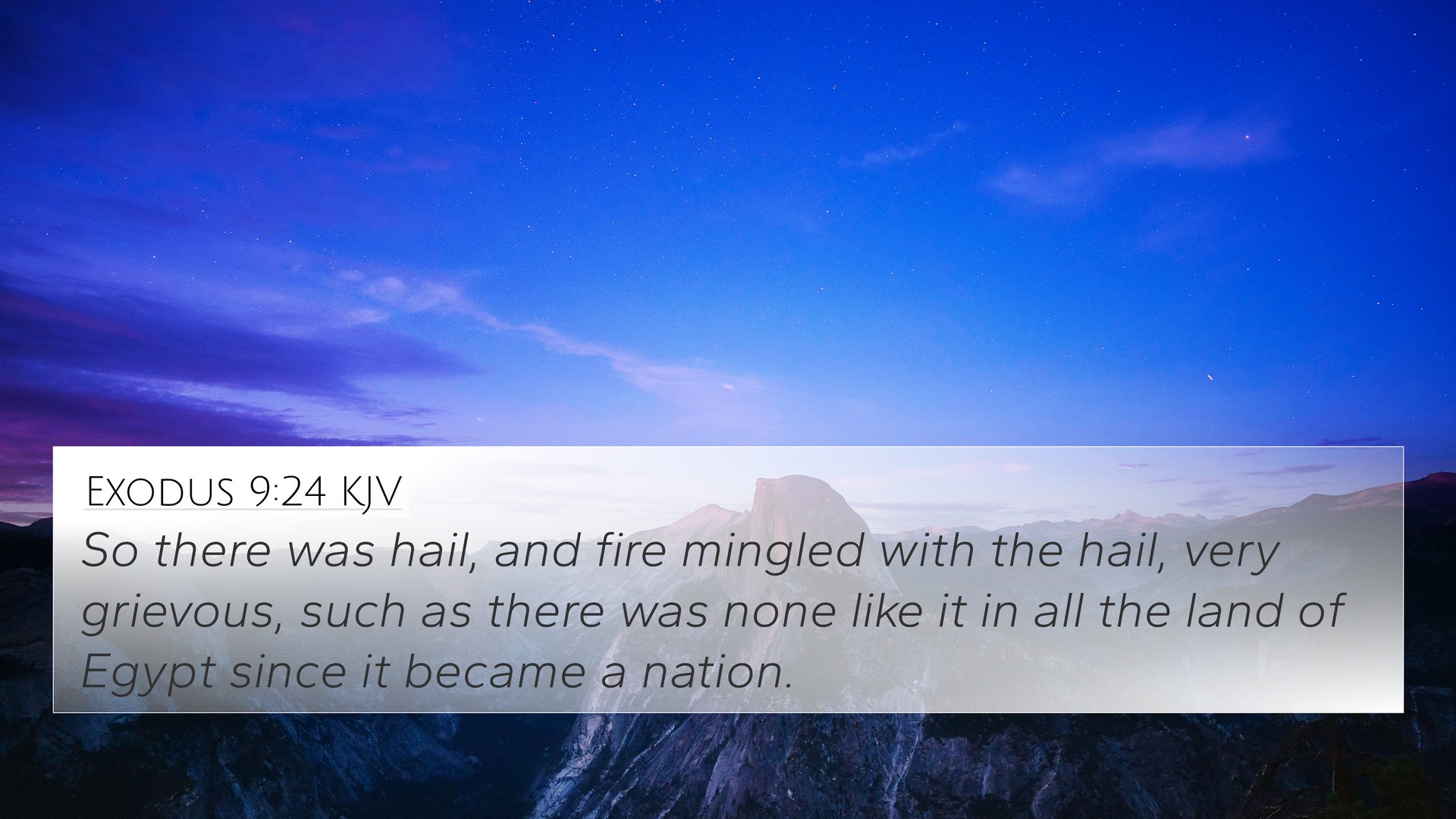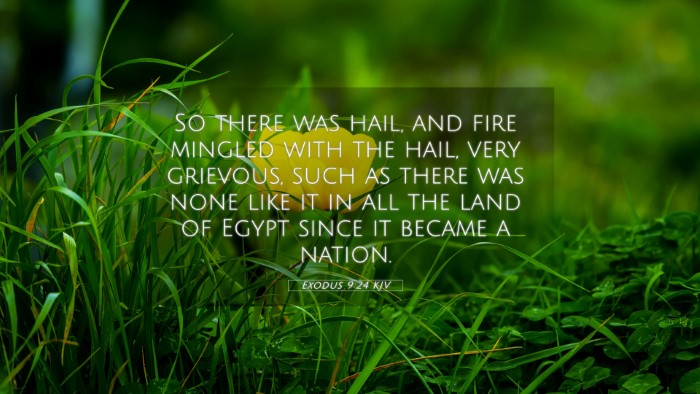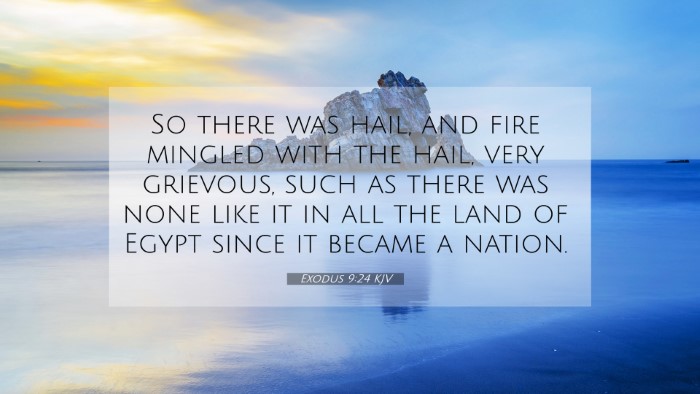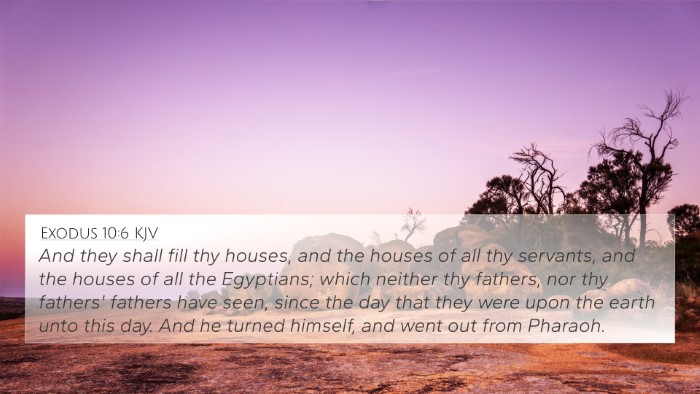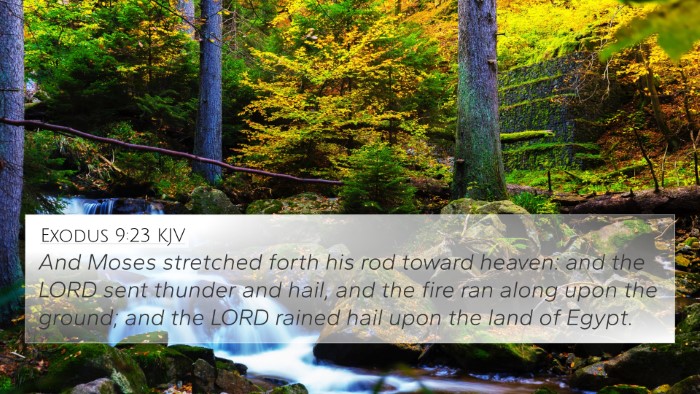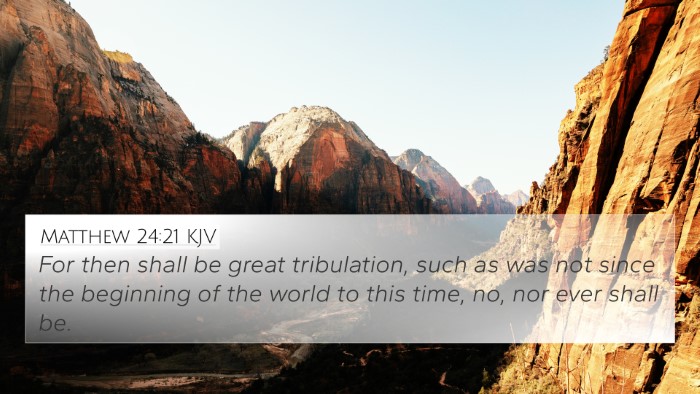Understanding Exodus 9:24
Verse: Exodus 9:24 states, "So there was hail, and fire mingled with the hail, very grievous, such as there was none like it in all the land of Egypt since it became a nation."
Meaning and Interpretation
The verse describes one of the ten plagues that God inflicted upon Egypt as a demonstration of His power and authority. This particular plague of hail and fire was unprecedented and highlights the severity of God's judgment against Pharaoh and the Egyptian gods.
Insights from Public Domain Commentaries
-
Matthew Henry's Commentary
Henry emphasizes that the mixture of hail and fire signifies the intense nature of God’s judgments. He notes that it serves a dual purpose: it destroys crops and livestock while also instilling fear in the hearts of the Egyptians. This plague was not only a physical affliction but also demonstrated the impotence of Egyptian deities, as they were worshiped for fertility and weather control.
-
Albert Barnes' Commentary
Barnes provides a detailed description of the phenomenon of hail combined with fire, suggesting that it may have appeared like a storm of fire within the hail. He highlights God's sovereignty over creation, showcasing how nature is commanded by its Creator to serve His purposes. The unique aspect of this plague, he argues, is its function as a moral lesson to the people of Egypt to acknowledge the Lord's power and authority.
-
Adam Clarke's Commentary
Clarke reflects on the symbolism of hail and fire, interpreting the event as a call to repentance. He notes that the severity of the punishment was meant to lead the Egyptians to recognize God's greatness. The phrase “none like it in all the land of Egypt” underlines the uniqueness of this event in Egyptian history, intended to break Pharaoh’s stubbornness and lead to eventual liberation for the Israelites.
Bible Verse Cross-References
This verse connects with several other scriptures that illustrate themes of divine judgment and power:
- Exodus 9:13-14: Highlights the introduction of the plagues, showcasing God’s intent to demonstrate His power.
- Exodus 10:1-2: God further instructs Moses to make Pharaoh aware of the consequences of his rebellion.
- Psalm 78:47-48: Speaks of the plagues received by Egypt and serves as a historical reflection of God's might.
- Revelation 16:21: Discusses the future judgment involving hail, reflecting the continued theme of divine retribution.
- Isaiah 30:30: Serves as a prophetic reminder of God’s power showcased through natural disasters.
- Jeremiah 23:19-20: Expresses the severity and long-lasting effects of the Lord’s displeasure.
- Matthew 24:7: Reflects on natural disasters as signs of the end times, linking the Old Testament judgments with New Testament prophecies.
Tools for Bible Cross-Referencing
Understanding the connections between these verses can be enhanced using various tools:
- Bible Concordance: Useful for finding keywords and related verses quickly.
- Bible Cross-Reference Guide: A systematic approach to studying relationships between scriptures.
- Cross-Reference Bible Study: Engaging in study methods that directly compare related scriptures for deeper insights.
- Bible Reference Resources: Texts that compile verses that deal with similar themes or subjects.
Conclusion
Exodus 9:24 serves as a poignant reminder of God's power and authority over nature, a call to repentance for the Egyptians, and a foreshadowing of future divine judgments as depicted in both the Old and New Testaments. By engaging with various commentaries and cross-references, we can glean a deeper understanding of this pivotal moment in biblical history.
Exploring Additional Themes
For those interested in further exploring biblical themes related to Exodus 9:24, consider investigating:
- How to find cross-references in the Bible.
- Identifying connections between Old and New Testament narratives.
- Thematic studies linking prophetic writings with historical accounts.
